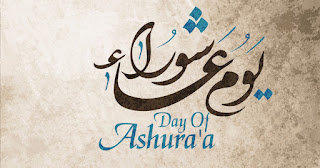Muharram:
(Surah At-Taubah: 9:36)
The four months mentioned in the Ayah are the months of Dhul-Qadah, Dhul-Hijjah, Muharram and Rajab.
Muharram is one of the most important months for Muslims and marks the start of the Islamic New Year.Based on the lunar Hijri calendar, Muharram is the first month of the Islamic New Year and is considered a holy month, second only to Ramadan in its significance.
As in the Holy Quraan Allah Almighty Says:
“Indeed, the number of months with Allah is twelve [lunar] months in the register of Allah [from] the day He created the heavens and the earth; of these, four are sacred.”(Surah At-Taubah: 9:36)
The four months mentioned in the Ayah are the months of Dhul-Qadah, Dhul-Hijjah, Muharram and Rajab.
This is evident from the words of Holy Prophet (S.A.W.) on the occasion of his last Hajj sermon:
حَدَّثَنَا مُحَمَّدُ بْنُ الْمُثَنَّى، حَدَّثَنَا عَبْدُ الْوَهَّابِ، حَدَّثَنَا أَيُّوبُ، عَنْ مُحَمَّدِ بْنِ سِيرِينَ، عَنْ ابْنِ أَبِي بَكْرَةَ، عَنْ أَبِي بَكْرَةَ رَضِيَ اللَّهُ عَنْهُ، عَنِ النَّبِيِّ صَلَّى اللَّهُ عَلَيْهِ وَسَلَّمَ، قَالَ: "الزَّمَانُ قَدِ اسْتَدَارَ كَهَيْئَتِهِ يَوْمَ خَلَقَ اللَّهُ السَّمَوَاتِ وَالْأَرْضَ السَّنَةُ اثْنَا عَشَرَ شَهْرًا مِنْهَا أَرْبَعَةٌ حُرُمٌ، ثَلَاثَةٌ مُتَوَالِيَاتٌ ذُو الْقَعْدَةِ، وَذُو الْحِجَّةِ، وَالْمُحَرَّمُ، وَرَجَبُ مُضَرَ الَّذِي بَيْنَ جُمَادَى وَشَعْبَانَ".
REFERENCE:
Sahih Al Bukhari 1: Chapter 60, Hadith 3197
“The year is of twelve months, out of which four months are sacred: Three are in succession Dhul-Qa' da, Dhul-Hijja and Muharram, and (the fourth is) Rajab.”
(Sahih Bukhari: 3197)
“The year is of twelve months, out of which four months are sacred: Three are in succession Dhul-Qa' da, Dhul-Hijja and Muharram, and (the fourth is) Rajab.”
(Sahih Bukhari: 3197)
This is the reason that Muharram is one of the sacred months and these words of our Prophet (S.A.W.) confirms its sanctity.
 |
| Muharram/Ashura'a | Ashura 2020 || 10th Muharram,Karbala |
Muharram begins after the sighting of the new moon on the final day of the Islamic calendar.
Ashura'a:
Ashura; the tenth day of the month of Muharram in the Islamic calendar. A time of rejoicing and deliverance, yet a time of grief and sorrow. From both the Sunni and Shi’a traditions, this day holds very significant to many.
Some other people attribute the sanctity of this day to the martyrdom of Husain Ibn Ali (R.A.) but the sacredness of 'The day of Ashura' cannot be ascribed to this event only as the sanctity of this day was established during the days of the Prophet (S.A.W.), much earlier than the birth of Husain Ibn Ali (R.A.). Martyrdom of Husain Ibn Ali (R.A.) is one of the most tragic episodes of our history and it is one of the merits of Husain (R.A.) this sad event in Karbala took place on the day of Ashura as Allah choose big days for big events.
Fasting on Ashura'a:
The practice of fasting on Ashura was kn own even before emergence of Islam. When the Prophet (S.A.W.) arrived in Madinah at the time of migration, the Jews were observing the fast on 'Ashura' and they said: "This is the day when Moses became victorious over Pharaoh," On that, the Prophet (S.A.W.) said to his companions (R.A.):
حَدَّثَنِي مُحَمَّدُ بْنُ بَشَّارٍ، حَدَّثَنَا غُنْدَرٌ، حَدَّثَنَا شُعْبَةُ، عَنْ أَبِي بِشْرٍ، عَنْ سَعِيدِ بْنِ جُبَيْرٍ، عَنْ ابْنِ عَبَّاسٍ، قَالَ: قَدِمَ النَّبِيُّ صَلَّى اللَّهُ عَلَيْهِ وَسَلَّمَ الْمَدِينَةَ، وَالْيَهُودُ تَصُومُ عَاشُورَاءَ، فَقَالُوا: هَذَا يَوْمٌ ظَهَرَ فِيهِ مُوسَى عَلَى فِرْعَوْنَ، فَقَالَ: النَّبِيُّ صَلَّى اللَّهُ عَلَيْهِ وَسَلَّمَ لِأَصْحَابِهِ: "أَنْتُمْ أَحَقُّ بِمُوسَى مِنْهُمْ، فَصُومُوا".
REFERENCE: Sahih Al Bukhari 1: Chapter 66, Hadith 4680
"Narrated Ibn `Abbas: When the Prophet arrived at Medina, the Jews were observing the fast on 'Ashura' (10th of Muharram) and they said:
"This is the day when Moses became victorious over Pharaoh, On that, the Prophet said to his companions, You (Muslims) have more right to celebrate Moses' victory than they have, so observe the fast on this day."
(Sahih Bukhari: 4680)
 |
| Muharram/Ashura'a | Ashura 2020 || 10th Muharram,Karbala |
“If I live until next year, I will fast the ninth day (of Muharram) too.”
(Ibn Majah: 1736)
Unfortunately, Prophet (S.A.W.) did not live to see the next year. Therefore, Muslims consider the 9th and 10th of Muharram as significant days in the Islamic calendar and observe fast on these days.
[Sahih Muslim: 1134 (a)]
Earlier on, it was obligatory to fast on the 10th of Muharram. However later, fasting was made obligatory in Ramadan only and fasting on 10th Muharram was made optional. As narrated by Ayesha (R.A.) that Prophet (S.A.W.) said:
حَدَّثَنَا يَحْيَى بْنُ بُكَيْرٍ، حَدَّثَنَا اللَّيْثُ، عَنْ عُقَيْلٍ، عَنِ ابْنِ شِهَابٍ، عَنْ عُرْوَةَ، عَنْ عَائِشَةَ رَضِيَ اللَّهُ عَنْهَا. ح وحَدَّثَنِي مُحَمَّدُ بْنُ مُقَاتِلٍ، قال: أَخْبَرَنِي عَبْدُ اللَّهِ هُوَ ابْنُ الْمُبَارَكِ، قال: أَخْبَرَنَا مُحَمَّدُ بْنُ أَبِي حَفْصَةَ، عَنِ الزُّهْرِيِّ، عَنْ عُرْوَةَ، عَنْ عَائِشَةَ رَضِيَ اللَّهُ عَنْهَا، قَالَتْ: "كَانُوا يَصُومُونَ عَاشُورَاءَ قَبْلَ أَنْ يُفْرَضَ رَمَضَانُ، وَكَانَ يَوْمًا تُسْتَرُ فِيهِ الْكَعْبَةُ، فَلَمَّا فَرَضَ اللَّهُ رَمَضَانَ، قال رَسُولُ اللَّهِ صَلَّى اللَّهُ عَلَيْهِ وَسَلَّمَ: مَنْ شَاءَ أَنْ يَصُومَهُ فَلْيَصُمْهُ، وَمَنْ شَاءَ أَنْ يَتْرُكَهُ فَلْيَتْرُكْهُ".
REFERENCE:
Sahih Al Bukhari 1: Chapter 26, Hadith 1592
Narrated `Aisha: The people used to fast on 'Ashura (the tenth day of the month of Muharram) before the fasting of Ramadan was made obligatory. And on that day the Ka`ba used to be covered with a cover. When Allah made the fasting of the month of Ramadan compulsory, Allah's Apostle said, Whoever wishes to fast (on the day of 'Ashura') may do so; and whoever wishes to leave it can do so.
“Whoever wishes to fast (on the day of ‘Ashura’) may do so; and whoever wishes to leave it can do so.”
(Sahih Bukhari: 1592)
However, Prophet (S.A.W.) used to fast on the day of Ashura even after the fasting in Ramadan was made obligatory.
So fasting on the day of ’Ashura' is a confirmed Sunnah of the Holy Prophet and makes one entitled to a great reward from Allah. According to Sahih Hadith, one of the many blessings of Allah for a person who observe fast on ‘Day of Ashura’ that his / her sins of the past year will be forgiven.
Narrated from Abu Qatada (R.A.) that the Prophet (S.A.W.) said:
“Fasting the day of ‘Ashura’, I hope, will expiate for the sins of the previous year.”
(Ibn Majah: 1738)
The Hadith clearly mentions the word of Prophet (S.A.W) as “I hope” which means that the person should observe the fast wholeheartedly for Allah only and seek reward from Allah only and, Inshallah, Allah almighty will reward that person with removal of his sins during the previous year.
Sunni and Shia Muslims mark Muharram differently. For many Sunni Muslims, this month is the beginning of the Islamic New Year and symbolises peace and reflection and also the remembrance of the great sacrifice of Hazrat Imaam Hussain (A.S) in KARBALA.
Muharram commemorates the death of the Prophet Muhammad’s grandson, Hussein Ibn Ali. After questioning the legitimacy of the caliph Yazid, Hussein was murdered during the Battle of Karbala, which took place on the day of Ashura in the year AD 680.
Muharram commemorates the death of the Prophet Muhammad’s grandson, Hussein Ibn Ali. After questioning the legitimacy of the caliph Yazid, Hussein was murdered during the Battle of Karbala, which took place on the day of Ashura in the year AD 680.
 |
| Muharram/Ashura'a | Ashura 2020 || 10th Muharram,Karbala |
Muharram, with all of its complexity, will always be a month of deep reflection for Muslims across the world. For those Muslims who follow the Shia branch of Islam, this month represents a solemn, reflective day in Islamic history.
Due to the brutality of the battle and the murder of the Prophet’s grandson during a month when fighting is forbidden, many Shia mourn with a specific way to remember the bravery of the Prophet’s family. Whether Muslims are celebrating the beginning of the Islamic New Year or lamenting the loss of life,
In the Sunni tradition it is widely known that we fast on this day to show gratitude to God and champion the day Moses and the Children of Israel were saved from the tyrannical rule of Pharoah as was narrated from Prophet Muhammad (pbuh).; In Sunni as well as Shiite tradition it is known to be a day of mourning and sorrow in which they commemorate and lament over the tragedy and massacre of Karbala when Hussain (A.S), grandson of Prophet Muhammad (pbuh), was brutally killed along with members of his family and his companions. This was due to Hussain’s (A.S) refusal to pledge allegiance to Yazid, the caliph of the time, as he was seen by many as an unjust ruler.
On the day of Ashura, as I participated in the annual fast, I also remembered the tragedy of Karbala and the killing of Hussain (A.S). Although seen as extremely significant, and almost even central in Shiite tradition, Hussain (A.S) and the rest of the Ahlel Bayt (family of Prophet Muhammad) do in fact hold a very special place in my heart. As someone who ascribes himself to the Sunni tradition, loving Hussain (A.S) and rest of the Ahlel Bayt is not contradictory, but rather an integral aspect of my faith. Due to the frequent affiliation of the Ahlel Bayt within Shiite tradition some, from both Sunnis and Shiites, perhaps might see this as an anomaly or an oxymoron, yet for me it is simply another manifestation of being a Sunni just as loving the companions of Prophet Muhammad (pbuh) is. Being a Sunni and loving the Ahlel Bayt are not mutually exclusive. Just as many people may automatically attribute Jesus with Christianity, so too will many attribute Hussain (A.S) and the Ahlel Bayt with Shiite tradition only, however, that should not be the case.
I may not participate in the self-flagellation and lamentation over the killing of Hussain (A.S) as practiced by Shiites, yet my love for him is ever so strong. Hussain (A.S), to me, is a beacon of love. Hussain (A.S), to me, is an extension of Prophet Muhammad’s (pbuh) wisdom, justice and mercy. Hussain (A.S) represents one of the Salaf, the righteous predecessors. Just like the Sahaba, or companions of Prophet Muhammad (pbuh), Hussain (A.S) is a well that never runs dry and a light that never extinguishes. To me, Hussain (A.S) and the Ahlel Bayt are to be championed much like the companions of Prophet Muhammad (pbuh) and there is no contradiction in doing so.
As Hussain (A.S) plays an important role in Islamic history, it is saddening knowing that some muslims are oblivious of him and how much Prophet Muhammad (pbuh) displayed his love for him. In various narrations within the Sunni and Shiite tradition Prophet Muhammad (pbuh) was informed by the angel Gabriel about the slaughter of Hussain (A.S) and mourned over the tragedy. My message for fellow Muslims is that it is vital and very crucial that we study the lives of the Ahlel Bayt so as not to allow others to monopolize their role within their respective traditions. Learn about Hussain (A.S) and allow your love for him to manifest.
When we commemorate Ashura and remember the tragedy of Karbala, we are reflecting on our own history, as Muslims. We mourn and we grieve and we do so in our own way. This was the grandson of our beloved Prophet, an imam of the Muslims and the leader of the youth of Paradise. The blood of Hussain,(A.S) the cries of Zainab and Ruqayah, and the thirst of Abbas ibn Ali are integral to muslim's tradition and history. Let us not overlook this event and let us come to an understanding and a love for Hussain and the Ahlel Bayt.











No comments:
Post a Comment